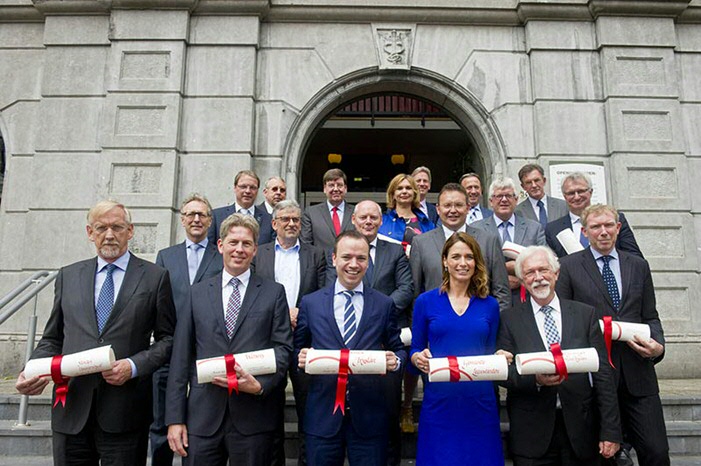Samenwerking hoger onderwijs krijgt in Fryslân impuls

Vrijdag 24 juni a.s. hebben 13 kennisinstellingen en 2 overheden het Hoger-Onderwijsakkoord Fryslân (HOAF) ondertekend. Dit was in de aanwezigheid van een aantal nazaten van hoogleraren van de universiteit van Franeker. Met deze ondertekening hebben partijen de samenwerking om in Leeuwarden meer masteropleidingen en promotie-onderzoeksprojecten te realiseren bekrachtigd.
Fryslân streeft naar een samenhangende keten van opleidingen vanaf basisonderwijs tot aan universitair onderwijs, de zogeheten ‘doorlopende leerlijn’. In het Hoger-Onderwijsakkoord Fryslân komen de afspraken rond samenwerking in opleidingen van hoger onderwijs samen. Het doel is om de Friese economie en kennisinfrastructuur te versterken wat moet leiden tot meer kennis, een versterkte regionale innovatiekracht met meer bedrijvigheid en meer werkgelegenheid. Het hoger-Onderwijsakkoord borgt daarnaast de aanwezigheid van de Rijksuniversiteit Groningen in Leeuwarden.
De overeenkomst geeft het kader aan waarbinnen de samenwerking tot stand komt op basis van de eigen unieke en zelfstandige positie van de instellingen. In het HOAF zijn verder de ambities geformuleerd van partijen met name op het gebied op het gebied van stages, doorlopende leerlijnen richting associate degrees, (pre)masters, professionele masters, academische masters en (promotie)onderzoeksprojecten in aansluiting op economische speerpunten. Daarnaast willen partijen energie steken in het versterken van het academisch imago van Leeuwarden.
Ondertekenaars
Het Hoger-Onderwijsakkoord Fryslân werd vandaag ondertekend door bestuurders van de Rijksuniversiteit Groningen, Universiteit Twente, Wageningen University Research centre, NHL Hogeschool, Stenden University of Applied Sciences, Van Hall Larenstein University of Applied Sciences, Minerva Academie voor Popcultuur Hanzehogeschool Groningen University of Applied Sciences, Wetsus, Fryske Akademy, Waddenacademie, Dairy Campus, Medisch Centrum Leeuwarden,Tresoar, provincie Fryslân en gemeente Leeuwarden. Liefst drie universiteiten en één hogeschool met hun hoofdvestiging buiten Friesland ondertekenden dus mee. Hiermee aangevend dat ook voor niet Friese kennisinstellingen de kennis-infrastructuur hun na aan het hart ligt.

City Campus
Tijdens de bijeenkomst werd bekendgemaakt dat Campus Fryslân het voornemen heeft om de Beurs in Leeuwarden in gebruik te nemen als het nieuwe universiteitsgebouw. Voorzitter van het College van Bestuur van de RUG Sibrand Poppema ondertekenden samen met wethouder Thea Koster van de gemeente Leeuwarden (eigenaar) hiertoe een voorlopige overeenkomst.
Van de gebouwen die zijn onderzocht bleek de Beurs het meest geschikt. Een belangrijk criterium hierbij was de het nieuwe universiteitsgebouw in het hart van de stad moet staan. Het gebouw moet in totaal voor zo’n 1000 studenten (zowel bachelor-, master-, als PhD-studenten) onderwijs- en onderzoekruimte gaan bieden.
De studenten van het bachelor college zullen een groot deel van hun studie intern doorbrengen. Dat wil zeggen wonen en slapen op een campus. De Beurs wordt het hart van de City Campus van RUG/CF. Huisvesting voor de studenten zal in de onmiddellijke omgeving gerealiseerd gaan worden.
